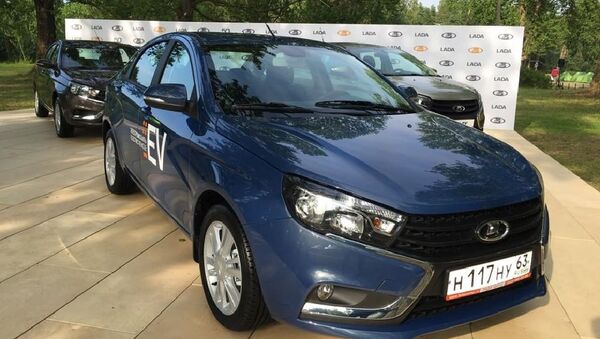The Vesta EV, built on the same platform as the company's new flagship sedan, the Lada Vesta, is equipped with a 60kW electric motor, which offers the equivalent of about 82 hp and has a battery capacity of 25 kilowatt-hours. The car's motor will allow the 1.4 metric ton sedan to go from 0-100 km/h in 15.5 seconds, and reach a top speed of 140 km/h.
АвтоВАЗ показал электрическую Lada Vesta: https://t.co/lKglyX9cnr#новости_4tochki #Lada #электромобиль #4tochki pic.twitter.com/BIeParSb0O
— 4tochki.ru магазин (@4tochki) 26 июля 2016 г.
The prototype's batteries (placed under the hood and under the rear passenger seats) will be able to get a full charge after about nine hours of charge time from an ordinary electrical outlet. The car's batteries provide it with 170 km-worth of juice in-city, and 150 km on combined highway-city driving.
Commenting on Avtovaz's growing lineup of prospective electronic vehicles, Sergei Udalov, executive director of the automotive market analytical agency Autostat, told Russian media that if the company wants to build up a real presence in foreign markets, it will have to develop and sell electric cars. "Moreover, there are countries in which the manufacturers of electric vehicles are provided with significant preferences." Effectively, Udalov noted, "the automotive industry is slowly but surely heading in this direction, and the main thing is to keep pace."
LADA VESTA CNG ПОСТУПИТ В ПРОДАЖУ В КОНЦЕ 2016 ГОДА https://t.co/vfubWL0Dho pic.twitter.com/vSYK5xlffp
— Евгений Шушаков (@EvShu) 12 июля 2016 г.
Lada Vesta CNG will go on sale in late 2016.
The long-expected Lada Vesta began winning over the Russian automotive market last year. According to Rossiyskaya Gazeta, the ordinary, gasoline-powered Vesta is one of the top five most-sold new cars in Russia; it's currently in fourth place.




